FIDE 2014: The Scramble for Africa

The history of Africa is one of intrigue and mystery. It is sometimes called “The Dark Continent” and is typically forgotten when important matters are at hand. There is one time that Africa is not forgotten and that is every four years during the FIDE election. FIDE is the international chess body of more than 150 federations all having one vote on important chess matters such as elections. Why is this important? Africa carries 40 crucial votes and perhaps a margin of victory in a close race for FIDE President.
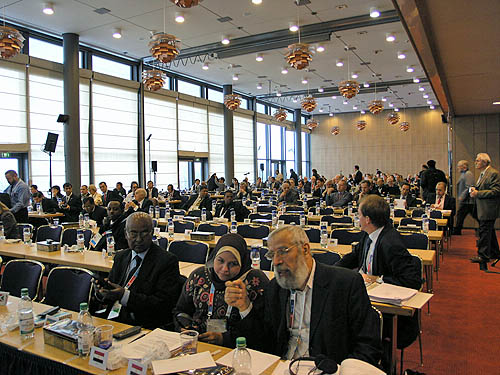
Delegates of 2008 FIDE General Assembly in Dresden, Germany.
Photo by Daaim Shabazz.
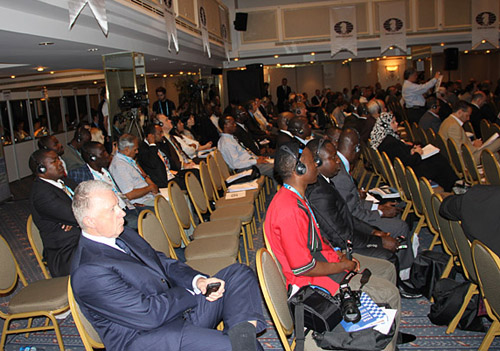
At the 2012 assembly in Istanbul, notice African federations clumped together in the back of the hall. Often viewed as one entity, they are expected to deliver the votes in the upcoming election for FIDE President. Photo by Daaim Shabazz.
Over the past couple of decades, candidates come to Africa with gifts in hand to woo the chess officials into supporting their campaigns. What has become interesting is the importance that campaigns are placing on the African vote. Why Africa? Perhaps this is where the campaign is won.
The perception is that African votes are up for grab and that one must tout Chess-in-Schools, bring some gifts or pay for Olympiad expenses as if this is enough to sway opinion. Sometimes it is. Africa does not vote as a bloc and this is why there is such a battle. There is no other region where the competition for votes is as fierce and there is no region who could benefit more from incremental improvements.
During the last several months, both incumbent FIDE President Kirsan Ilyumzhinov (fidefirst.com) and former World Champion Garry Kasparov (kasparov2014.com) have criss-crossed the vast continent from east to west, from north to south trying to carry the vote. Of course Ilyumzhinov won the last two elections quite handily, but faces a formidable opponent in Kasparov. Unlike the previous candidates, Kasparov has a combination of skills, charisma and energy to carry the day. However, one thing that must be asked of both candidates is the notion of democracy.

Ilyumzhinov answered the journalists’ questions in Togo.
Photo by fide.com.
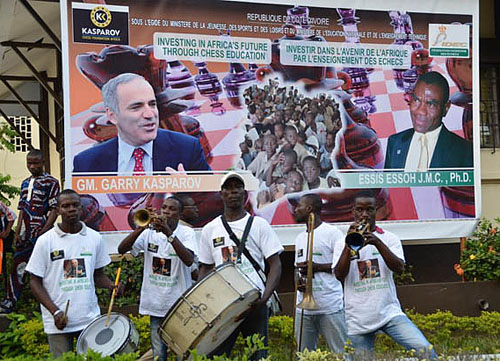
Kasparov welcomed in the Ivory Coast.
Photo by kasparov2014.com.
While Africa’s vote is deemed important, does FIDE plan to keep the “one-nation, one-vote” theme? Last campaign there was candidate Anatoly Karpov who implied that regions like African nations do not deserve voting parity with more powerful chess nations. The Chess Drum carried a story, “Africa: Too Much Voting Power in FIDE?” discussing these issues. Karpov, another former World Champion, stated that his comments were taken out of context.
It is uncertain whether Kasparov has addressed this issue directly, but African nations must ask the candidates this question. Does FIDE plan to have a “Security Council” as Karpov suggested? If so it would be a tragedy and the condoning of elitism. If Africa is to stay relevant, there must be an adherence to democratic principles. Here is what the aforementioned article raised four years ago,
Nations, big and small, are divided, suing each other and there is tremendous internal discord. When nations within Africa become scapegoats for what is deemed a flawed system, then chess has failed in championing the virtues of democracy. When Africa is neglected until the FIDE elections every four years, they are then considered corrupt or gullible for accepting services that should have been rendered all along. This is unfair.
We are hearing the same comments today about Africa, a continent with fledgling federations, fragile chess cultures and inconsistent funding. Are these weaknesses made into attractive targets by campaigns who bring money, the promise of Chess-in-Schools, or a cache of sets, clocks and DGT boards? Of course these resources are solely needed in Africa, but when they are accepted it appears as if they are currying flavor with one campaign or another. This is unfortunate because it makes Africa appear gullible.
Why does Africa have to wait every four years to get any attention? Where is the sustained effort in Africa to make it a viable chess region? While other regions are seeing healthy growth and producing new Grandmasters, Africa struggles to hold a continental championship. In the 2013 African Championship in Tunisia, only eight nations participated.
There has been a paucity of major tournaments held in Africa since the FIDE Knockout in Libya in 2004. There have been bright spots such as the 2013 Tanzania Open and the Cuca Opens in Angola. Visits by Judit Polgar, Viswanathan Anand and Nigel Short are welcome, but will Africa see such luminaries visit Africa on a regular basis? Africa deserves better.

Make no mistake…
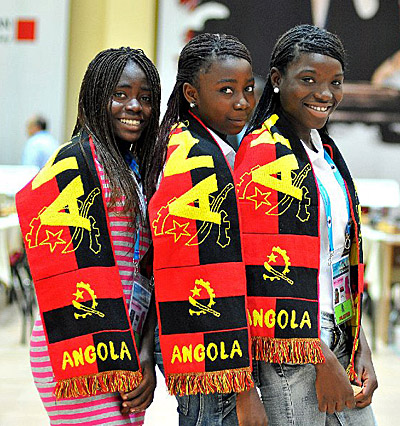
…African nations…
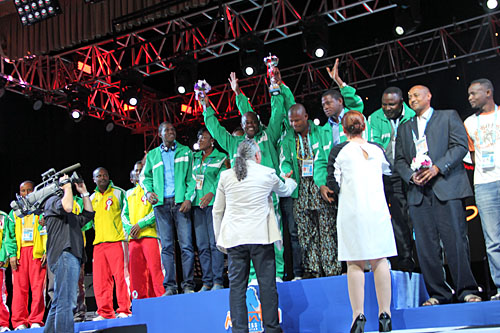
…are passionate and capable!!
Photos by David Lada, Arman Karakhayan and Daaim Shabazz.
Daaim Shabazz, “Africa: Too Much Voting Power in FIDE?” 17 September 2010.

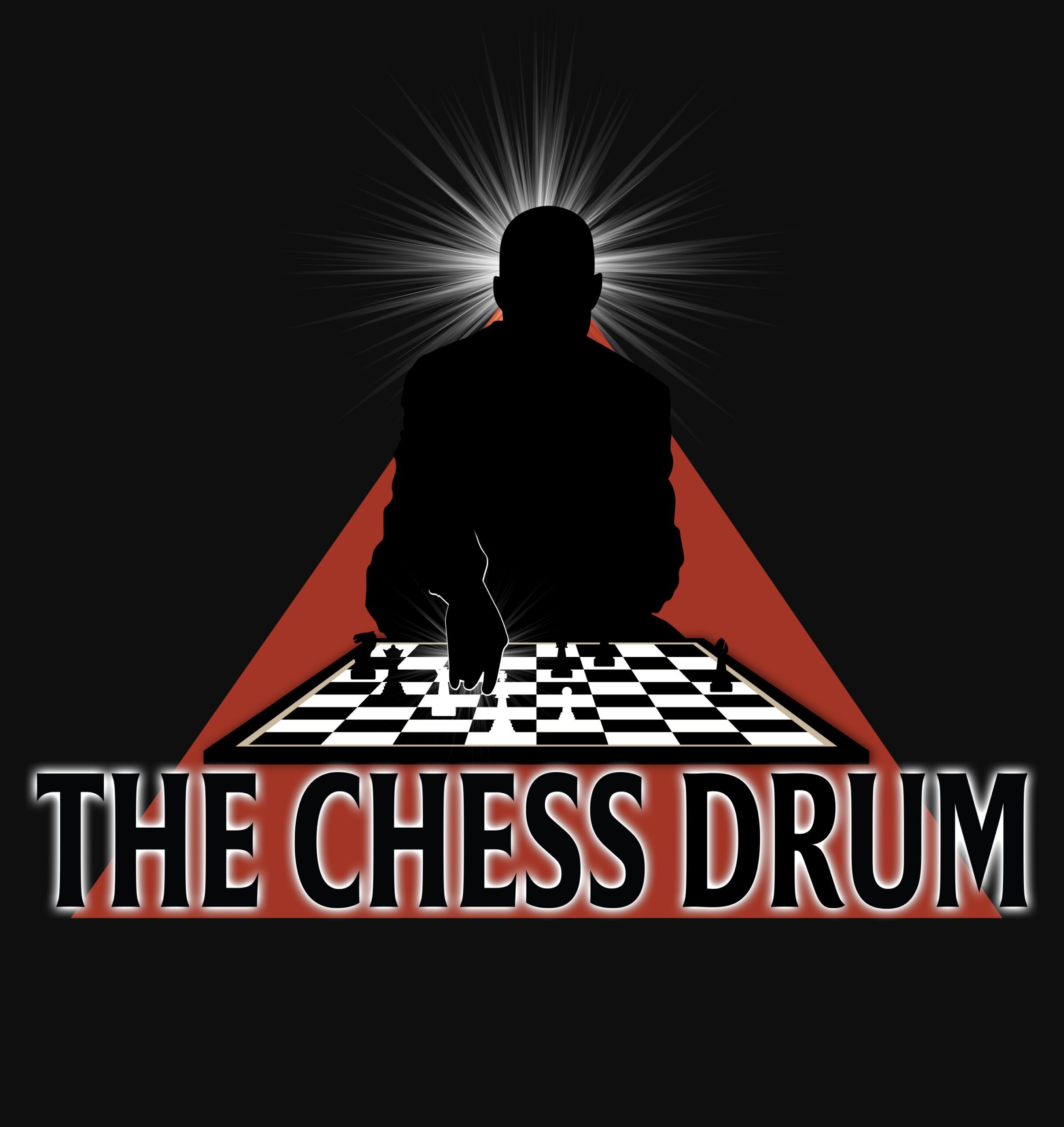
Saturday, February 8, 2014
Africa is not for sale!
Dear Presidents, Delegates and Chess friends,
After discussions with several of you and following a meeting with Mr. Kasparov in India, I would like to share the conclusions I have reached. I note with concern the negative undertones by Mr. Kasparov and his team in relation to the chess world. In India, I was shocked when Mr. Kasparov ignored and insulted FIDE, the organizing committee and the All India Chess Federation.
Up till this moment, I have been patiently monitoring the developments these last few weeks, but the situation is now quite clear for me. In a desperate attempt to get votes from the same African Federations that Mr. Kasparov has ignored for dozens of years in his professional career, he is now attempting to portray himself as the saviour of Africa and the chess world.
One wonders where Mr. Kasparov was these last three years as clearly Africa was not his priority then. Four years ago along with Mr. Karpov, they were campaigning that Kirsan was not looking after the professional players and instead was looking after the Federations in continents like Africa!
To add insult to injury, I am very surprised that following the published statement of “One Federation One Vote” in Tallinn and the subsequent website launch by Mr. Kasparov, the statement has suddenly disappeared from his campaign website! Why, I ask? It is clearly because Mr. Kasparov and his associates, like Mr. Karpov, do not believe that all Federations in FIDE are equal.
Where Mr. Kasparov cannot succeed in convincing a Federation for support, he tries to sabotage the Federation leadership; now Mr. Kasparov is smiling at people where he needs a vote but let me remind him that he did not bother in his life to even greet these people. His strategy is clearly divisive; attempting to select Federations he believes are vulnerable, and with offers only subject to his winning the elections in FIDE!
Do Federations understand what is coming once they sell their souls? I am afraid that Mr. Kasparov is using us for his political ambitions and his business.
Now, Mr. Kasparov has finally discovered that Africa needs support and resources as a result of the forthcoming elections! Kirsan, for the last eighteen years, has been financially supporting FIDE and Federations directly, so that we could invest in development programs, events, seminars and materials. I believe in having a leadership which is tolerant and charismatic, a leadership which has been clearly shown by Kirsan Ilyumzhinov.
Gens una sumus
Lewis Ncube (signed by)
FIDE Senior Vice President &
Former President and Delegate, Chess Federation of Zambia
Link: https://fidenot4sale.blogspot.com/2014/02/africa-is-not-for-sale.html
https://www.thechessdrum.net/blog/2014/02/17/west-african-feds-support-kasparov2014/
Ilyumzhinov in Togo and Cameroon
https://www.thechessdrum.net/blog/2014/02/26/ilyumzhinov-in-togo-and-cameroon/
by Cherno Omar Bobb, 3 March 2014
Larbi Houari, president of West Africa Chess Association, has expressed his readiness to help the Gambia Chess Federation (GCF) have a structure in place as well as handle the project of chess in schools.
Mr Houari, who was speaking to reporters on Friday, 28 February 2014 at the Badala Park Hotel during the opening ceremony of the Gambia Chess Federation Open Championship, added that he is in the country to listen to Gambia Chess Federation to know their problems and then advise them on how they can organise themselves as well as on how to provide money for them to keep some people working all year round.
He stated that he was positively impressed with the Gambia Chess Federation as well as positively surprised by many things such as the volunteers, their energy and wish for change as well as their support for Garry Kasparov and his projects in Africa.
He added that he was happy to represent Kasparov in The Gambia, noting that he will be personally involved in the change and development of chess in The Gambia, not only for chess players but also in schools.
“We have to develop chess in high-level play and low-level play,” he pointed out, saying: “When I say low-level play it means from the very beginning for kids in schools because chess has proven its educational advantages for memories, strategies, concentration and many positive aspects of chess.”
He remarked that they have many statistics in the African Kasparov Chess Foundation, noting that they are confident in that they can try to introduce chess in schools and then get the numbers and with the numbers they hope partners will be interested to help the Federation go ahead.
The GCF needs to be solid, he went on, saying: “We will help the Federation have a structure and to handle the project of chess in schools.”
“We are thinking of a long-term project,” said the founder of West Africa Chess Association, who added that “if you want to develop chess you need long-term projects – something during the year with schools and clubs.”
The championship, fully sponsored by Kasparov, is an event dedicated to remind people that chess still exists in The Gambia, Mr Houari, a member of Kasparov Foundation, also said, adding that after the event they would start work in earnest.
The championship is not by way of developing chess but a kind of publicity for chess, he added.
He also said: “I am here to listen to Gambia Chess Federation’s problems and then if I can advise on how they can organise themselves and how to provide money to keep some people working all the year; not from time to time because what kills the sport is non-continued process. So we have to make sure ones we start we work on it every day, week, month, year.”
His relationship with the President of the Gambia Chess Federation is really good, he said, noting that they are like brothers.
For this reason, he is sure they will definitely have successful development of chess in the country, he noted, but was quick to add that they have to be patient because there is a lot of work to be done.
The giving of prizes to the players is a good encouragement (the winner of the championship will receive $600, second position $400, and from 3rd to 10th positions each $150), he observed, saying they need players to become actors in chess development.
“Players should not just play but also involve themselves in helping the Federation to extend chess, particularly in schools,” he highlighted, calling on the players not to concentrate only on playing chess as it can serve as a full-time job for them (for example, arbiters, trainers and such kinds of jobs around chess).
Mr Houari, who is personally engaged in helping The Gambia Chess Federation to progress, added that he thinks the Federation has all they need but only need the first push.
“The first push Kasparov told me to come and listen to you and your needs to try to make a plan for long term,” he revealed, saying they will give them the push to see that chess in The Gambia rise in different ways.
In conclusion he said: “I hope The Gambia will also have an influence in other neighboring countries.”
Link: https://allafrica.com/stories/201403032267.html
Here is a story about Garry Kasparov’s visit to Tunisia. Lakhdar Mazouz presents his account of the FIDE candidate’s dealing with Tunisia, but from his writings, it may prove that Tunisia mishandled his visit more than Kasparov mishandled the arrangements.
It appeared that Kasparov was invited to visit from Tunisia by the TCF President Mr. Yousri DALY and they scheduled the visit for November 30th. After that, the Yousri then invited Kirsan Ilyumzhinov and he was given an EARLIER date of November 10th. This is a breach of etiquette. Why bring Ilyumzhinov to Tunisia BEFORE Kasparov when you approached Kasparov first??? No wonder Kasparov was upset!
Shame on Tunisia.
https://lakhdar-mazouz.blogspot.ca/2014/04/garry-kasparov-desperate-for-support.html
Brief report on the visit of Vice-President of FIDE and President of ACC to RWANDA
https://alinihatyazici.blogspot.com/2014/03/brief-report-on-visit-of-vice-president.html
Garry Kasparov tips youngsters
https://www.newvision.co.ug/news/655177-garry-kasparov-tips-youngsters.html